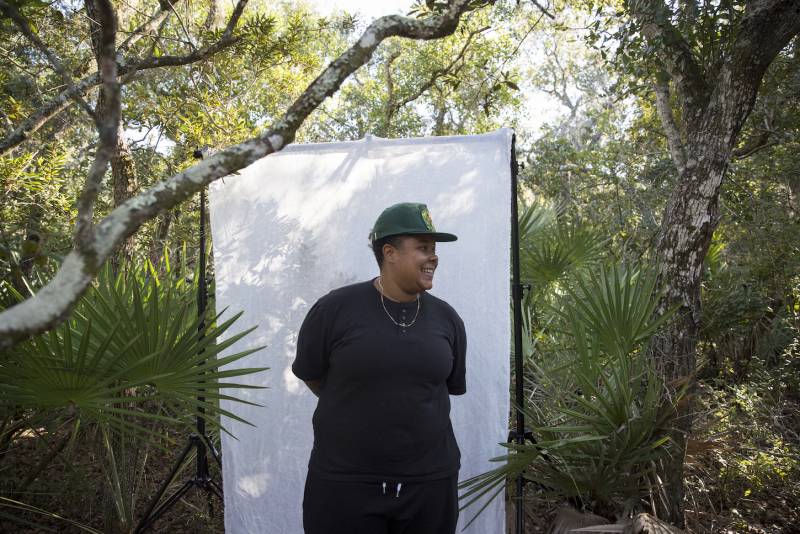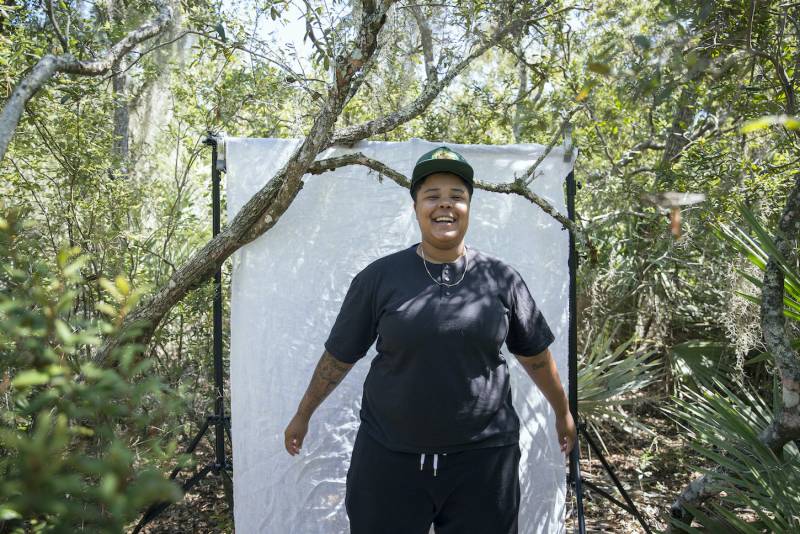For the next month, Rightnowish will be featuring artists with local roots who are taking the sounds of the Bay to a national stage.
Nappy Nina is a lyricist with a smooth-sultry delivery that’s almost jazz-like, especially when coupled with some signature Boom-Bap production. In her songs, she raps about breakups, missing Oakland, the disappointing produce in Brooklyn, and navigating rough financial waters.
She’s gotten mentions from the Grammys and Bandcamp. And she’s been working on a streak of exciting projects. For the educational organization, Flocabulary, Nina was commissioned to pen a rhyme that tells the story of Toni Morrison. A few weeks ago, she dropped a new single, “Pandemy Stimmy,” which features Stas THEE Boss. Soon, she’ll release a new EP, Double Down, in collaboration with New Jersey-based producer, J Words.

This week on Rightnowish, we talk to Nappy Nina about her disdain for the term femcee, how her Bay Area upbringing influences her craft and how some of my favorite songs came together.
Below are lightly edited excerpts of my conversation with Nappy Nina.
PEN: …OK, so for folks who’ve never been to East Oakland… how did it influence you? What did you see out there that made you grow into the artist that you are today?
NINA: One of the main influences that I had growing up in East Oakland… just spending a lot of time with my pops, who’s really a community man. He has a couple of radio shows and he’s just really connected to a lot of folks in Oakland. And I think seeing that has made me wanna carry on that tradition within my own work.
PEN: Shout out to Pops. Greg Bridges deep into the jazz game. Did he put you in any jazz artists that stuck with you?
NINA: He tried to put me on so much jazz when I was younger and I was so reluctant. [laughs] I kicked and screamed about it often, like I was in the jazz band in middle school. I play upright bass, I didn’t really appreciate it and hated it at the time. And now I’m just like, yo, why didn’t I just stick with it? That would have been ill.
PEN: I could see a middle school upright bass… like the bass is probably as big as you, right?
NINA: Exactly. I had to carry it all around, like, it was just hella inconvenient.
PEN:… there’s this thing that you do of calling out “Mencees.”
NINA: Yeah. (laughs)
PEN: What’s that all about?
NINA: Man. One day I was just talking to my manager like I’m so frustrated with the “female emcee” lists… And I’ve been on this rampage for a long time. Like nobody is like, ‘Yo. So I know they’re a rapper, but they’re a man. So like just, you know, give them a break.’ There’s no qualifiers for dudes like that. And it’s fucking ridiculous that eight out of ten times somebody wants to give me props it’s on some, “Yeah. But like she’s a ill Femcee, ya mean,”… I hate it.
PEN: …I saw something you did recently. It’s an illustrated piece where you laid down some bars in recognition of Toni Morrison, is it called Flocabulary?
NINA: Yeah. Flocabulary. Yeah. That was dope…So Flocabulary is like a dope app and tool for teachers to teach students, like about all types of different subjects through hip hop. And they reached out to me and they had this Toni Morrison piece in mind. And so I wrote first two verses and a hook. Last I heard, the program was sold to like all of L.A. public schools. So to think that a lot of young Cali kids are learning about Toni Morrison through me… just like makes me smile to the end, I was like, wait, I get to be like the rap Bill Nye. And they were like, yeah (laughs).
PEN: … Do you use your music as a catharsis?
NINA : Yeah, always. Always. I don’t know if it’s like the healthiest thing, but I always feel like when I’m not feeling great, then I know that I can probably write some good shit. Definitely.
PEN: Again, you know, like I just I struggle with that. I put myself out there. You have any tips for people who are like maybe scared to release their vulnerabilities?
NINA: I would just say that it’s all going to come out somehow… Like they may come out, you know, with somebody else are like deep in those moments when you’re by yourself, like they’re always going to find you. And for me, that’s kind of just seems like the easiest way to deal with it.

Rightnowish is an arts and culture podcast produced at KQED. Listen to it wherever you get your podcasts or click the play button at the top of this page and subscribe to the show on NPR One, Spotify, Apple Podcasts, TuneIn, Stitcher or wherever you get your podcasts.


